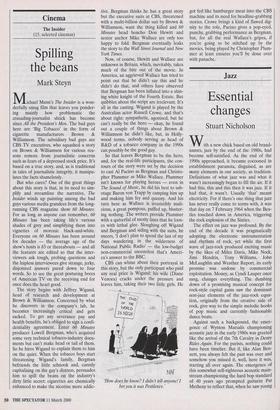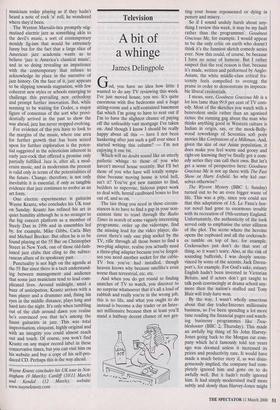Jazz
Essential changes
Stuart Nicholson
With a new chick based on old brand- names, jazz by the end of the 1980s, had become self-satisfied. As the end of the 1990s approached, it became cocooned in establishment paranoia, disguised, as are many elements in our society, as tradition. Definitions of what jazz was and what it wasn't increasingly began to fill the air. If it had this, this and this then it was jazz. If it had that, • it wasn't. Usually 'that' meant electricity. For if there's one thing that jazz has never really come to terms with, it was that day on 7 February 1964 when the Bea- tles touched down in America, triggering the rock explosion of the Sixties.
The effect on jazz was profound. By the end of the decade it was pragmatically adopting the electronic instrumentation and rhythms of rock, yet while the first wave of jazz-rock produced exciting music by the likes of Miles Davis, Mike Nock, Jimi Hendrix, Tony Williams, John McLaughlin and Weather Report, its early promise was undone by commercial exploitation. Money, as Cyndi Lauper once sang, changes everything. The dumbing down of a promising musical concept for rock-style capital gains saw the dominant non-jazz elements of the jazz-rock equa- tion, originally from the creative side of rock, give way to the simple melodic hooks of pop music and currently fashionable dance beats.
Against such a background, the emer- gence of Wynton Marsalis championing acoustic jazz in the early 1980s was greeted like the arrival of the 7th Cavalry in Destry Rides Again. For the purists, nothing could have been timelier. But if, like Alan Ben- nett, you always felt the past was over and somehow you missed it, well, here it was, starting all over again. The emergence of this somewhat self-righteous acoustic main- stream championing the hard bop standard of 40 years ago prompted guitarist Pat Metheny to reflect that, when he saw young musicians today playing as if they hadn't heard a note of rock 'n' roll, he wondered where they'd been.
The Wynton Marsalis-ites promptly stig- matised electric jazz as something akin to the devil's music, a sort of contemporary mouldy fig-ism that would be extremely funny but for the fact that a large slice of American jazz academia wants us to believe 'jazz is America's classical music', and in so doing revealing an impatience with the contemporary that refuses to acknowledge its place in the narrative of jazz history. On the face of it, jazz appears to be slipping towards stagnation, with few coherent new styles or schools emerging to challenge this prevailing new orthodoxy and prompt further innovation. But, while seeming to be waiting for Godot, a major figure of consensus of the sort who provi- dentially arrived in the past to show the way ahead, jazz has never stopped evolving.
For evidence of this you have to look to the margins of the music, where one area for further growth that has been seized upon for further exploration is the poten- tial suggested in the eclecticism inherent in early jazz-rock that offered a promise only partially fulfilled. Jazz is, after all, a mod- ernist music, and in modernism the present is valid only in terms of the potentialities of the future. Change, therefore, is not only inevitable it is essential, if only as tangible evidence that jazz continues to evolve as an art form.
One electric experimenter is guitarist Wayne Krantz, who concludes his UK tour on Sunday. Krantz has refined his art in quiet humility although he is no stranger to the big concert platform as a member of Steely Dan in 1996 and in ensembles led by, for example, Mike Gibbs, Carla Bley and Michael Brecker. But often he is to be found playing at the 55 Bar on Christopher Street in New York, one of those old-fash- ioned jazz clubs that cling to the subter- ranean allure of its speakeasy past. Punctuality is not high on the agenda at the 55 Bar since there is a tacit understand- ing between management and audience that some jazz musicians tend to lead com- plicated lives. Around midnight, amid a buzz of anticipation, Krantz arrives with a bass player and a drummer and, fixing his eyes in the middle distance, plays long and hard into the night. It's only when tumbling out of the club around dawn you realise he's convinced you that he's among the finest guitarists in jazz. This was total Improvisation, eloquent, highly original and with an integrity you could almost reach out and touch. Of course, you won't find Krantz on any major record label in these conservative times, but you can visit him on his website and buy a copy of his self-pro- duced CD. Perhaps this is the way ahead.
Wayne Krantz concludes his UK tour in Not- tingham (9 March); Cardiff (10111 March) and Kendal (12 March); website: www.waynekrantz. cam



































































 Previous page
Previous page